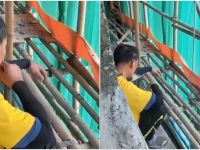The 15 members of the UN Security Council held three hours of preliminary talks on a draft resolution offering Iraq "a last chance" to avoid disaster, and agreed to meet again on Friday, AFP reported.
"The substance is very clearly, and intended very clearly to be, a last chance offer to Iraq," Britain's ambassador to the United Nations and co-sponsor of the draft, Jeremy Greenstock, told reporters.
He said the offer was genuine: "Take the weapons inspection process seriously; it is going to be a tough one, but it's going to be a fair one, under UN rules, and if you get it wrong that's a disaster for you."
Before the consultations began, the United States distributed the new draft resolution on Iraq that contained minor changes, apparently made in a concession to Russia, France and China, any of which, as permanent council members with the US and Britain, can veto a resolution.
It drops some demands but would give U.N. inspectors immediate and unconditional access to all sites in Iraq and warn Baghdad of "serious consequences" if it fails to cooperate. It said Iraq is still "in material breach of its obligations" under the ceasefire which ended the Gulf War in 1991.
The draft directs U.N. inspectors to report to the council "any interference by Iraq with inspection activities, as well as any failure by Iraq to comply with its disarmament obligations." The council would convene immediately "to consider the situation and the need for full compliance with all of the relevant Security Council resolutions in order to restore international peace and security."
The US ambassador, John Negroponte, said the draft provided "a very solid basis indeed" for negotiation, but Greenstock said "it's going to take a few more days" before a vote is taken.
A senior administration official told AP Wednesday's meeting was part of a new U.S. strategy to pressure France, China and Russia by actively taking the U.S. case to a wider audience. Before the consultations, the Russian ambassador, Sergei Lavrov, said the draft failed to address two basic concerns which his government had made clear to a US envoy in Moscow late last month.
"We cannot agree to any automacity in the use of force, and we cannot agree to unimplementable, unrealistic demands" imposed on Iraq against the wish of the arms inspectors, he said.
Meanwhile, Secretary of State Colin Powell said the United States would listen to the concerns of fellow U.N. Security Council members on its tough new Iraq proposal, but it won't "walk away from the basic principles."
Iraq needs to know there will be consequences if it doesn't comply with weapons inspections, and that it can't "sit back and smile," Powell said. "We want to give (inspectors) what they need to do the job, and that job has to be the disarmament of Iraq," he said at a news conference.
Earlier, Powell said the United States wasn't looking for an armed conflict with Iraq. "We should try to avoid war whenever possible," he said.
Iraqi response
"The revised US draft, which is worse (than the initial one), is a humiliation for the United Nations and the international community," Iraqi Foreign Minister Naji Sabri told Qatar's Al-Jazeera television channel.
"The draft is a declaration of war against the United Nations, and not only against Iraq. Its goal consists not only of attacking Iraq but also harming the prestige of the United Nations," Sabri said Thursday.
Iraq had taken "all necessary steps to welcome teams of inspectors," Sabri said, expressing hope that the Security Council "will not adopt measures that will block the missions of these teams." "The measures contained in the US draft pose impossible questions," Sabri said.
Iraqi Vice President Taha Yassin Ramadan earlier warned that the "insistence of the criminal US administration on having the Security Council adopt a new resolution is clearly part of US plots to justify an aggression against Iraq." (Albawaba.com)
© 2002 Al Bawaba (www.albawaba.com)







